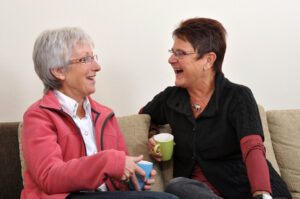Tips For Dressing A Senior Parent With Alzheimer’s
If your senior parent has Alzheimer’s and you are taking care of them it’s easy to get overwhelmed by trying to help them do things like a shower, get dressed, and get ready for the day each day. There are some techniques that you and their home care providers can use that will make these tasks easier and less stressful for both of you. The most important thing when you’re helping a senior parent with Alzheimer’s is to keep your tone light and neutral.

Home Care Warren NJ – Tips For Dressing A Senior Parent With Alzheimer’s
Your senior loved one may not always understand what you’re asking of them or what you’re trying to do. If you are impatient or frustrated they will hear it in your voice and that can make them upset because they want to please you.
Some other things that you can do to make dressing a parent with Alzheimer’s easier are:
Get Home Care Services
Home care that specializes in Alzheimer’s care can make your life and your senior loved one’s life a lot easier. Home care providers that are trained to do things like help seniors with dementia shower, use the bathroom, get dressed, and eat are helpful. There are techniques that have been proven to work that make those tasks easier on your senior parent and an Alzheimer’s care provider knows those techniques. Home care also gives family members a break from doing the awkward and sometimes difficult tasks that their senior parent needs to have help with.
Label Everything
To make it easier to choose clothes for your senior parent and to allow them to help in the decision of what they want to wear label all dresser drawers and storage bins with what items of clothing are inside. Then you can help your senior loved one choose an outfit for the day by having them select one item from each drawer to put together and make an outfit. Or you can ask them to pick out a shirt they want to wear and they can choose one from the drawer that has a shirt label on it.
Encourage Them To Do As Much As They Can By Themselves
If your senior loved one is able to do some of the tasks that must be done to get dressed let them do the things they can do. Maybe they can’t pull up the zipper on their pants but they can pull a shirt over their head. Or maybe they need help with their socks but they can put on shoes. Encourage them to do any tasks they can do easily even if it means that the process of getting dressed takes longer.
Use Adaptive Devices
If your senior parent is taller than you or is heavy and you have trouble helping them with certain tasks because of their size use adaptive devices to make it easier. There are adaptive devices that will help seniors do things like put on their socks, button a shirt, or pull on underwear. Those devices can be a big help.





